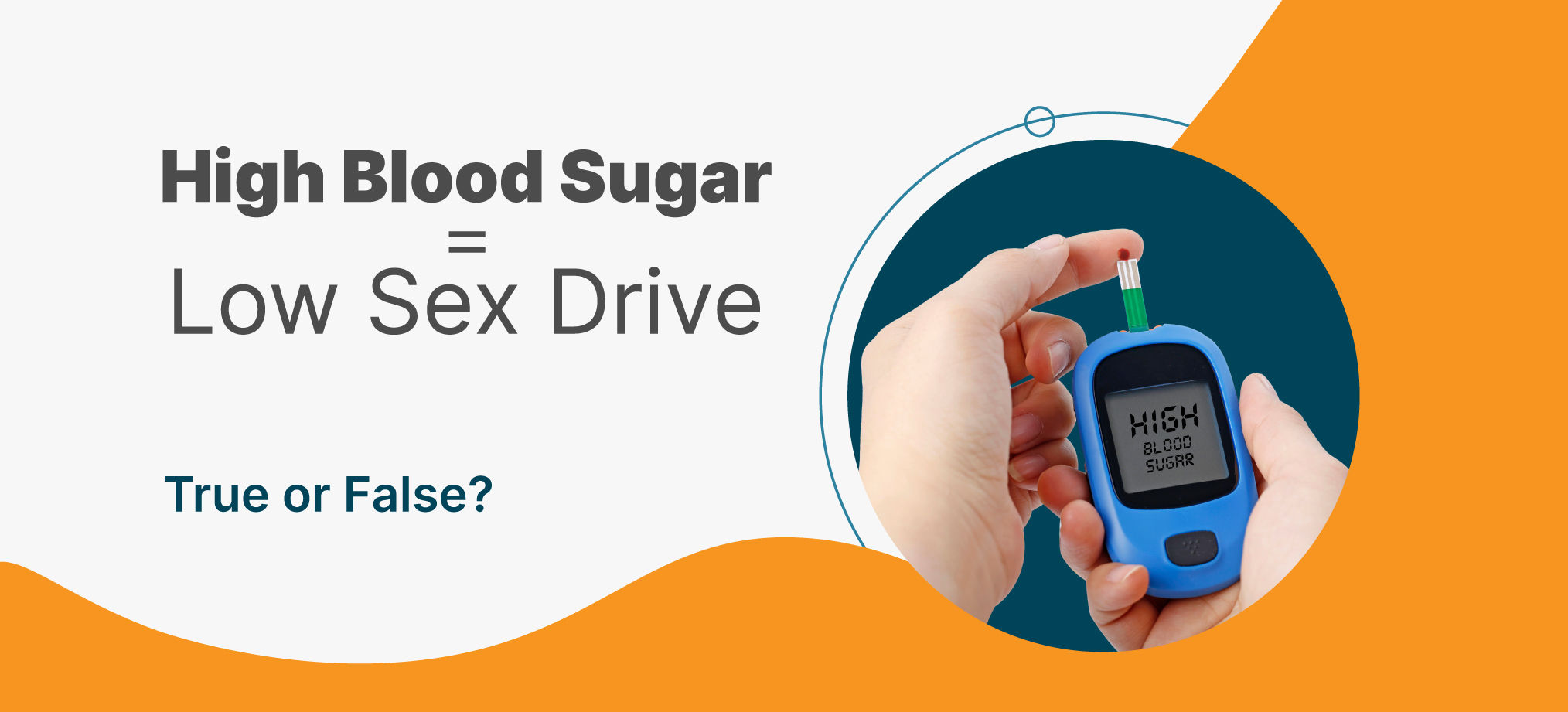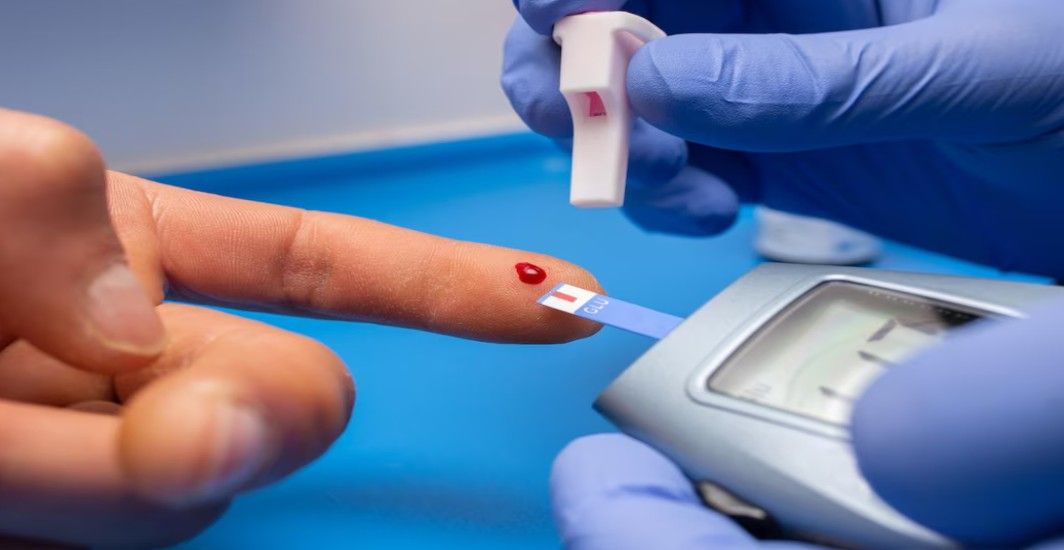Diabetes Management
Can Diabetes Cause Sexual Dysfunction?
5 min read
By Apollo 24/7, Published on - 14 December 2021, Updated on - 05 March 2024
Share this article
0
1 like

Sexual health is a subject that rarely gets the attention that it deserves. While the topic is no longer as taboo as it used to be, many adults with sexual dysfunction continue to suffer in silence due to the stigma attached to it. While sexual health issues can affect just anyone, diabetes can increase the likelihood of developing such problems.
For people living with diabetes, it is essential to detect and address sexual health issues early on. In many cases, diabetes and sexual dysfunction may also be associated with other chronic conditions such as hypertension and cardiovascular disease.
What is sexual dysfunction?
Sexual dysfunction can be defined as any difficulty that inhibits an individual or partners from performing sexual activity. It can be experienced at any stage of sexual activity, such as physical pleasure, desire, arousal, or orgasm. While anyone can experience sexual dysfunction, the risk of sexual dysfunction usually increases with age.
Some of the factors that can increase the risk of sexual dysfunction are:
- Diabetes
- Chronic stress
- Psychological issues
- Chronic conditions such as heart disease
- Alcohol use
- Drug abuse
- Certain medications
How Does Diabetes Affect Sexual Health?
Diabetes is a chronic health condition that is characterized by high blood sugar (glucose) levels. High levels of glucose can damage the inner linings of blood vessels. Over time, this damage decreases the elasticity of your blood vessels and causes them to narrow down, impeding the flow of blood to sexual organs.
Recommended reading: Explained: The Diabetes and Heart Disease Link
Having diabetes can increase the risk of diabetic neuropathy—a type of nerve damage caused by high blood glucose levels. Nerve damage caused by diabetes can impair the communication between the brain and nerves in the sexual organs, making it difficult to achieve sexual stimulation and orgasm.
Sexual problems associated with diabetes
Diabetes is a major cause of low libido or poor sex drive in both men and women. According to research, people with type 2 diabetes may experience low libido due to a combination of factors such as low energy levels, hormonal changes (low testosterone), stress, relationship issues, and side effects of medications. Besides low sexual desire, there are certain sexual problems that are unique to diabetic men and women.
Sexual problems specific to diabetic men
- Low testosterone: Testosterone is a hormone that plays an important role in regulating sex drive (libido). According to research, men with diabetes, particularly those who are older and obese, are at a greater risk of having low testosterone levels.
- Erectile dysfunction: Erectile dysfunction (ED) refers to the inability to get or keep an erection firm enough to perform sexual intercourse. High blood glucose levels in type 2 diabetes can damage small blood vessels and nerves that control sexual stimulation and response. It is believed that this damage impedes a man’s ability to achieve a firm erection.
- Retrograde ejaculation: Retrograde ejaculation is a sexual health issue that occurs when semen is ejaculated into the bladder instead of out of the penis. Men with abnormally high glucose levels may experience retrograde ejaculation due to nerve damage to the internal sphincter muscles.
- Peyronie’s disease: Peyronie's disease is a condition wherein fibrous scar tissue develops on the penis, causing it to curve or lose length or girth. The condition can make sexual intercourse rather painful for men. According to studies, having diabetes can significantly increase the risk of Peyronie's disease by encouraging the development of scar tissue on the penis.
Sexual problems specific to diabetic women
- Painful sex: Diabetic women are more likely to experience pain during intercourse. The pain can be attributed to the nerve damage that inhibits lubrication of the vagina during stimulation.
- Yeast and bladder infections: High blood glucose levels are known to facilitate the growth of yeast organisms. As a result, women with diabetes have a higher risk of developing yeast infections. Diabetic women with yeast infections may also experience discomfort or pain during sexual intercourse.
Recommended reading: Why are Urinary Tract Infections Common in Diabetics?
- Pregnancy and fertility issues: Diabetes and certain conditions linked to it such as obesity and polycystic ovarian syndrome can make conceiving a child difficult for women. High blood glucose levels during pregnancy can also harm the baby in the womb during the first weeks of pregnancy.
How to address sexual problems caused by diabetes?
It is possible to pursue an active sex life despite having diabetes. There are certain measures that can help you cope with sexual dysfunction while managing diabetes:
- Manage blood glucose levels: Experts suggest that you should maintain your blood glucose levels within a healthy range to avoid sexual dysfunction or prevent it from worsening further.
- Maintain optimum body weight: Being overweight or obese is a major risk factor for diabetes. Moreover, obesity can itself cause sexual dysfunction by damaging blood vessels and lowering testosterone levels in the body. Therefore, it is important to lose excess weight to avoid all these complications.
- Maintain an active lifestyle: Poor flow of blood to the sexual organs is one of the major causes of sexual dysfunction. Getting regular exercise can help control diabetes, improve heart health, and improve the flow of blood to sexual organs.
- Consider lubricants and medications: Lubricants can help ease vaginal dryness, a major cause of pain during sexual intercourse. Similarly, there are certain oral and topical medications that can be used to overcome issues such as low libido, vaginal dryness, and erectile dysfunction.
- Seek counseling: Chronic stress and anxiety can worsen sexual dysfunction. Poor sex life can also take a toll on relationships. A counselor or other mental health experts can help find ways to cope with stress.
- Consult a physician: Diabetics should not shy away from discussing their sexual health issues with a doctor, as they may indicate that the diabetes treatment regimen isn’t working.
Takeaway
A healthy and active sex life is an essential aspect of overall wellbeing. While diabetes may make it more challenging to lead a normal sex life, maintaining blood glucose levels within the target range and a healthy lifestyle can help resolve some of the issues associated with sexual dysfunction.
Discussing your concerns with a specialist can also help.
Consult a Sexual Health Expert
Diabetes Management
Consult Top Diabetologists
View AllLeave Comment
Recommended for you

Diabetes Management
Can High Blood Sugar During COVID-19 Indicate Diabetes?
According to a recent study, several new cases of diabetes are arising due to COVID-19. However, this form of diabetes is caused by the acute stress of a viral infection and is likely going to be temporary. The blood sugar levels might return to normal after discharge.
.jpg?tr=q-80)
Diabetes Management
List Some Self-Care Skills For Diabetic Patients
Are you Struggling with diabetes and striving for optimal health? Mastering self-care skills such as self-monitoring your blood sugar levels, maintaining a healthy weight, getting good nutrition, exercising regularly, quitting smoking, and regularly taking medication are all in your hands. With the right tools and guidance, managing diabetes effectively becomes less daunting. Dive in to unearth these practical and easy-to-follow tips. Don't forget, that your journey towards better health begins with you!

Diabetes Management
Blood Sugar Testing and Tracking in Prediabetic Individuals
Prediabetes, a tell-tale sign of elevated blood sugar levels, is an opportunity to intervene and prevent the onset of type 2 diabetes. Through regular blood sugar testing, tracking, and addressing cardiovascular risk factors, the progression towards diabetes can be delayed or even prevented.
Subscribe
Sign up for our free Health Library Daily Newsletter
Get doctor-approved health tips, news, and more.
Visual Stories

8 Fruits That are Incredibly Healthy for Diabetes
Tap to continue exploring
Recommended for you

Diabetes Management
Can High Blood Sugar During COVID-19 Indicate Diabetes?
According to a recent study, several new cases of diabetes are arising due to COVID-19. However, this form of diabetes is caused by the acute stress of a viral infection and is likely going to be temporary. The blood sugar levels might return to normal after discharge.
.jpg?tr=q-80)
Diabetes Management
List Some Self-Care Skills For Diabetic Patients
Are you Struggling with diabetes and striving for optimal health? Mastering self-care skills such as self-monitoring your blood sugar levels, maintaining a healthy weight, getting good nutrition, exercising regularly, quitting smoking, and regularly taking medication are all in your hands. With the right tools and guidance, managing diabetes effectively becomes less daunting. Dive in to unearth these practical and easy-to-follow tips. Don't forget, that your journey towards better health begins with you!

Diabetes Management
Blood Sugar Testing and Tracking in Prediabetic Individuals
Prediabetes, a tell-tale sign of elevated blood sugar levels, is an opportunity to intervene and prevent the onset of type 2 diabetes. Through regular blood sugar testing, tracking, and addressing cardiovascular risk factors, the progression towards diabetes can be delayed or even prevented.

